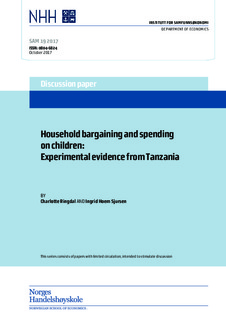| dc.contributor.author | Ringdal, Charlotte | |
| dc.contributor.author | Sjursen, Ingrid Hoem | |
| dc.date.accessioned | 2017-10-24T06:35:03Z | |
| dc.date.available | 2017-10-24T06:35:03Z | |
| dc.date.issued | 2017-10 | |
| dc.identifier.issn | 0804-6824 | |
| dc.identifier.uri | http://hdl.handle.net/11250/2461542 | |
| dc.description.abstract | It is frequently assumed that money in the hands of women leads to better out-comes for their children than money in the hands of men. However, empirical and theoretical evidence are mixed. We conduct a novel between-subject lab-in-the-field experiment to study whether increasing the wife's control over resources causes a couple to allocate more to their child. The paper provides two main insights. First, increasing the wife's bargaining power does not increase the share allocated to the child, but leads to more gender-equal allocations to children. Second, time preferences are important in explaining household decision-making; it is better for the child that the most patient spouse has more relative bargaining power. Our results highlight the importance of taking a broader set of preferences into account
when studying household decision-making, and suggest that policy aimed to increase spending on children should target the spouse with preferences most aligned with such spending. | nb_NO |
| dc.language.iso | eng | nb_NO |
| dc.publisher | Institutt for samfunnsøkonomi, NHH | nb_NO |
| dc.relation.ispartofseries | DP SAM;19/2017 | |
| dc.subject | Intra-household allocation | nb_NO |
| dc.subject | Female bargaining power | nb_NO |
| dc.subject | Tanzania | nb_NO |
| dc.title | Household bargaining and spending on children: Experimental evidence from Tanzania. | nb_NO |
| dc.type | Working paper | nb_NO |
| dc.subject.nsi | VDP::Samfunnsvitenskap: 200 | nb_NO |
| dc.source.pagenumber | 53 | nb_NO |
